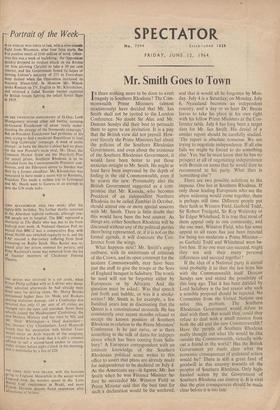Mr. Smith Goes to Town
Is there nothing more to be done to avert tragedy in Southern Rhodesia? The Com- monwealth Prime Ministers (almost unanimously) have decided that Mr. Ian Smith shall not be invited to the London Conference. No doubt Sir Alec and Mr. Duncan Sandys did their best to persuade them to agree to an invitation. It is a pity that the British view did not prevail. How- ever fiercely the Prime Ministers feel about the policies of the Southern Rhodesian Government, and even about the existence of the Southern Rhodesian Government, it would have been better to put those anxieties straight to Mr. Smith. He might at least have been impressed by the depth of feeling in the old Commonwealth, even if he scorns the new. Presumably also the British Government suggested as a com- promise that Mr. Kaunda, who becomes President of an independent Northern Rhodesia (to be called Zambia) in October, should attend one or more special sessions with Mr. Smith. There is little doubt that this would have been the best answer. As things are, either Southern Rhodesia will be discussed without any of the political parties there being represented, or, if it is not on the formal agenda, it will dominate the Con- ference from the wings.
What happens next? Mr. Smith's angry outburst, with its undertones of criticism of the Crown, and its open contempt for the modern Commonwealth, may have been just the stuff to give the troops at the Sons of England banquet in Salisbury. The words he used will not be forgotten either by Europeans or by Africans. And the question must be asked : Was that speech just froth and bubble, or was it a smoke- screen? Mr. Smith is, for example, a kw hundred years late in discovering that the Queen is a constitutional monarch. He has consistently over recent months refused to accept the known position of Southern Rhodesia in relation to the Prime Ministers' Conference. Is he just naive, or is there something in the talk of dates for indepen- dence which has been coming from Salis- bury? A European correspondent with an intimate knowledge of the Southern Rhodesian political scene writes to this office to assert that plans are already made for independence to be declared on July 4. As the Americans say—it figures. Mr. Ian Smith 'when he was Finance Minister be- fore he succeeded Mr. Winston Field as Prime Minister said that the best time for such •a declaration would be the weekend, and that it would all be forgotten by Mon- day. July 4 is a Saturday; on Monday, July 6, Nyasaland becomes an independent country, and a day' or so later Dr: Banda leaves to take his place in his own right with his fellow Prime Ministers at the Con- ference table. July 6 has long been a target date for Mr. Ian Smith. His denial of a similar report should be carefully studied. `The report is absolute nonsense. We are trying to .negotiate independence. If all else fails we might be 'forced to do something else.' Yes, but he must know that he has no prospect at all 'of negotiating independence with Britain on terms that he would dare to recommend to his party. What then is `something else'?
There are two possible solutions to the impasse. One lies in Southern Rhodesia. If only those leading Europeans who see the abyss widening would come together, there is perhaps still time. Different people put their faith in Winston Field, Garfield Todd, Sir Robert Tredgold, Sir Roy Welensky or Sir Edgar Whitehead. It is true that most of them appeal only to one community, and the one man, Winston Field, who has some appeal to all races has just been rejected for being too moderate a. Prime Minister— as Garfield Todd and Whitehead were be- fore him. If no one man can succeed, might they not sink their many personal differences and succeed together?
If the idea of a National party is unreal (and probably it is) then the last hope lies with the Commonwealth itself. Duncan Sandys. saw and stated the possibility of this long ago. That it has been derided by Lord Salisbury is the last reason why such a sensible proposal should be rejected. No Committee from the United Nations can solve this problem. The Southern Rhodesian Government would refuse to deal with them. But would they, could they refuse to deal with a small mission from both the old and the new Commonwealth? Have the people of Southern Rhodesia really thought out what life would be like outside the Commonwealth, virtually with- out a friend in the world? Has the British Government yet made clear what the economic consequences of unilateral action would be? There is still a great fund of goodwill in this country towards all the peoples of Southern Rhodesia. Only high- handed action by the Government of Southern Rhodesia can destroy it. It is vital that the grim consequences should be made clear before it is too late:


































 Previous page
Previous page